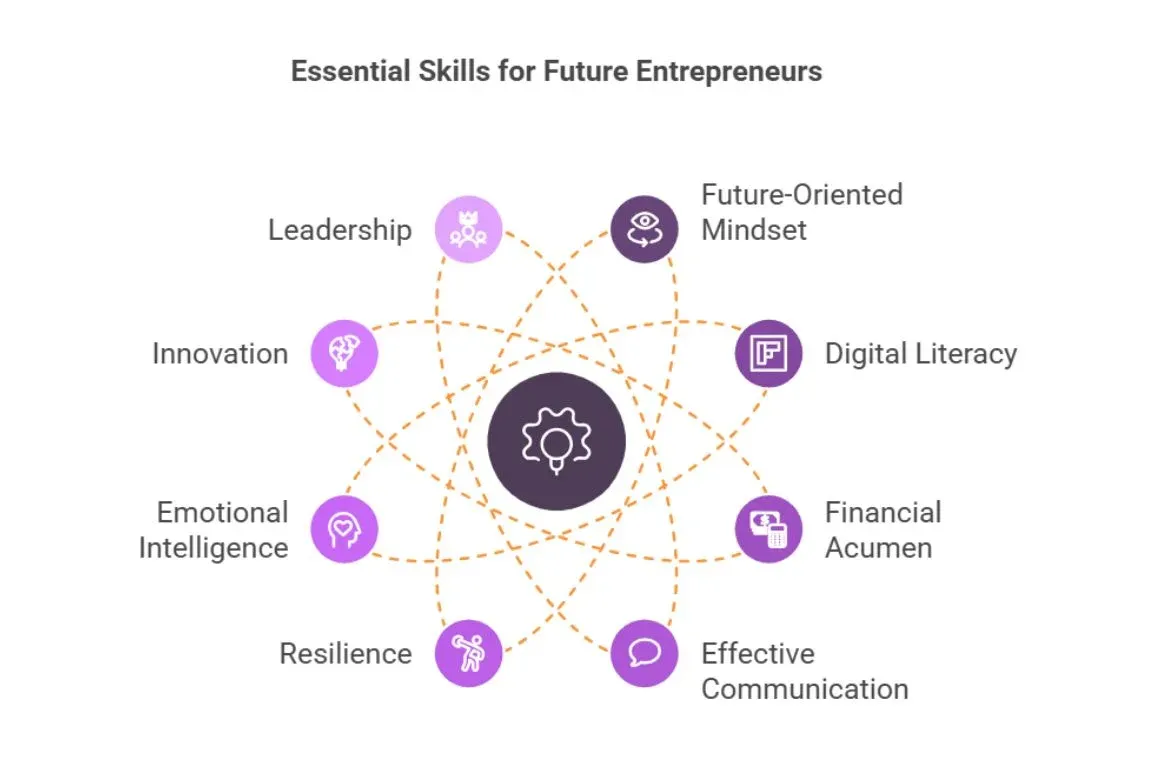Top 10 Essential Entrepreneurial Skills for Thriving in 2026

Ready to succeed as an entrepreneur in today's ever-changing business world? Skills that differentiate businesses now might not guarantee success in 2026.
Entrepreneurs face new challenges daily.
Strong entrepreneurship skills create ripples beyond personal achievement. These abilities create jobs, boost economic growth, and enhance life quality through groundbreaking products and services. Success depends on balancing technical expertise like financial management and digital literacy with people skills such as communication and problem-solving.
Strategic Thinking and Vision: The Entrepreneurial North Star
"The thrill is to keep envisioning what can be." — Oprah Winfrey, Media executive, actress, and philanthropist
Strategic thinking and vision guide entrepreneurs through uncertain business waters. Today's fast-changing marketplace demands clear strategic thinking and vision. These qualities make the difference between survival and success.

1. Developing a Future-Oriented Mindset
A future-oriented outlook forms the foundation of entrepreneurial thinking. Your future isn't set in stone you have the power to shape it. This mindset helps you link your actions to desired outcomes. You can turn opportunities into possibilities instead of viewing them as mere curiosities.
This entrepreneurial view lets you:
- See your future as unwritten
- Know you can influence outcomes
- Set achievable goals with confidence
Aspiring entrepreneurs who embrace forward thinking can exceed traditional business creation. Future-focused entrepreneurs become innovators and achievers. They reshape lifestyles, technologies, communities, and policies, whatever their environment.
2. Digital Literacy and Technology Adaptation
Essential Digital Tools for Entrepreneurs in 2026:
- AI-powered CRM, automated project management, and immersive collaboration tools enhance efficiency and customer engagement. These technologies streamline operations and improve team coordination.
- Utilizing these tools effectively allows for better customer understanding, task management, and remote team collaboration, providing a competitive edge.
AI Integration in Business Operations:
- AI automates tasks, analyzes data, and personalizes experiences, driving operational efficiency. Clear goals and expert development are crucial for successful AI adoption.
- AI integration frees up employee time, enables data-driven decisions, and improves customer interactions, leading to increased productivity and customer satisfaction.
Data-Driven Decision Making:
- DDDM uses data to guide strategic decisions, leading to increased productivity and profits. Data collection, processing, analysis, and implementation are key steps.
- This approach empowers organizations to make informed choices, optimizing business operations and customer acquisition.
Staying Ahead of Technological Disruptions:
- Anticipating disruptions through vulnerability assessments and emerging technology exploration is essential for competitiveness. Innovation labs and strategic collaborations facilitate this.
- Proactive adaptation and continuous technological monitoring ensure businesses remain relevant and agile in a rapidly changing digital landscape.
3. Financial Acumen and Resource Management
Understanding Business Finance Fundamentals:
- Key metrics, such as ROI, ROAS, working capital, and profit margins, guide informed decisions and assess financial health. Regular monitoring is essential.
- These metrics allow for accurate performance evaluation and strategic adjustments, ensuring long-term business viability.
Investment Strategy and Capital Acquisition:
- Securing aligned investors with relevant expertise is crucial for startup success. Diverse funding options should be explored.
- Investors require detailed performance metrics; entrepreneurs must demonstrate growth and profitability to attract capital.
Cash Flow Management in Uncertain Markets:
- Proactive cash flow management, through regular reviews and projections, mitigates risks during economic fluctuations. Scenario planning prepares for various outcomes.
- Optimizing receivables and payables through efficient collection strategies and incentives enhances short-term financial stability.
Financial Risk Assessment and Mitigation:
- Understanding and managing financial risks through avoidance, reduction, transference, or acceptance is vital. Balancing risk and reward is key.
- Strategies like insurance, emergency funds, and diversification minimize potential losses and ensure business continuity.
4. Effective Communication Across Multiple Channels
Mastering Digital Communication Platforms:
- Entrepreneurs must skillfully navigate various digital tools to engage customers and coordinate teams effectively. A unified platform approach streamlines interactions.
- Strategic tool selection and defined platform roles minimize communication clutter, enhancing efficiency and collaboration.
Crafting Compelling Business Narratives:
- Engaging stories build emotional connections, driving customer loyalty and increasing spending. Authentic narratives aligned with brand values resonate deeply.
- Integrating relevant data with emotional appeal strengthens trust and reinforces the core message, fostering stronger stakeholder relationships.
Cross-Cultural Communication for Global Markets:
- Understanding cultural communication nuances prevents misunderstandings in global ventures. Adapting to direct or indirect styles is crucial.
- Clear, simple language and awareness of non-verbal cues facilitate effective cross-cultural communication, building stronger international partnerships.
Active Listening: The Underrated Entrepreneurial Skill:
- Active listening cultivates trust and provides valuable insights for informed decision-making. It is a foundational skill for building strong relationships.
- Focusing on the speaker, using engaged body language, and asking open-ended questions ensure genuine understanding, revealing true customer needs.
5. Resilience and Adaptability in Changing Markets
Building Mental Fortitude for Business Challenges:
- Mental strength, built through reflection and exercise, is crucial for navigating business stress. A growth mindset transforms challenges into learning opportunities.
- Mentorship and journaling provide guidance and clarity, fostering emotional resilience and strategic thinking.
Pivoting Strategies When Plans Fail:
- Pivoting involves structured directional changes based on performance analysis, not abandoning the core vision. A clear, unemotional evaluation is key.
- Successful pivots refine existing ideas, adapting to market needs while preserving essential elements of the original concept.
Learning from Setbacks and Failures:
- Failure is a learning opportunity, not a dead end. Honest self-assessment after setbacks identifies areas for improvement.
- Entrepreneurs who learn from failures gain valuable experience, enhancing their ability to navigate future challenges.
Maintaining Work-Life Balance Under Pressure:
- Prioritizing personal time, even during busy periods, improves productivity and mental health. Setting boundaries is essential.
- Regularly unplugging from work enhances decision-making and creativity, investing in the entrepreneur's well-being.
6. Emotional Intelligence and Relationship Building
Understanding and Managing Your Emotions:
- Self-awareness enables emotion identification, while regulation provides a business edge. Reflection on emotional triggers enhances understanding and empathy.
- This process builds personal stability and allows for better interpretation of team dynamics, leading to smoother interactions.
Empathy in Leadership and Customer Relations:
- Empathetic leaders foster collaboration and prevent conflict, creating positive work environments. Understanding others' feelings improves communication.
- Empathy builds stronger customer relationships by understanding their needs, leading to a competitive advantage in customer experience.
Building Trust with Stakeholders:
- Transparent communication, through regular updates and feedback, builds credibility and trust. Stakeholder participation fosters a sense of value.
- This trust often translates into valuable support, with stakeholders offering strategic insights and connections when needed.
Conflict Resolution and Negotiation Skills:
- Active listening, emotional management, and professionalism facilitate conflict resolution. Effective negotiation leads to constructive solutions.
- Win-win negotiations build lasting relationships and trust, which are crucial for long-term entrepreneurial success.
7. Innovation and Creative Problem-Solving
Encouraging a Culture of Innovation:
- Leaders must actively foster an environment where innovation thrives, through support and guidance. Design thinking, like that utilized at IDEO and Google, encourages experimentation and collaboration.
- This culture requires psychological safety for risk-taking, a learning-from-failure mindset, innovation opportunities at all levels, and seamless interdepartmental collaboration.
Design Thinking for Business Challenges:
- Design thinking prioritizes customer needs, using a four-stage process (Clarify, Ideate, Develop, Implement) to develop relevant solutions.
- This approach involves empathetic observation, brainstorming, and iterative prototyping, ensuring solutions are both innovative and user-centric.
Balancing Creativity with Practicality:
- Successful entrepreneurship requires a blend of creative ideation and practical execution. Creativity generates ideas, while practicality ensures their viability.
- Entrepreneurs must integrate both approaches, leveraging creativity in ideation and practicality in implementation for sustainable, market-aligned innovation.
Collaborative Innovation Techniques:
- Teamwork enhances problem-solving by incorporating diverse perspectives. Techniques like crowdsourcing, brainstorming, and team creativity facilitate this.
- Diverse teams using methods like crowdsourcing, brainstorming, and iterative processes develop better solutions, though it is important to avoid issues like herd mentality within crowdsourcing.
8. Leadership and Team Management
Inspiring and Motivating Diverse Teams:
- Diverse teams foster innovation and better decisions. Leaders must understand individual motivations, as they vary greatly.
- Tailored recognition and psychological safety encourage open communication and unique contributions from all team members.
Delegation and Empowerment Strategies:
- Effective delegation relies on trust and the "5C's" approach: choose, communicate, coach, check-in, and celebrate.
- Empowerment provides team members with resources and autonomy, leading to increased efficiency and initiative.
Remote Team Management Skills:
- Focus on results over activities, establishing clear communication and availability expectations across time zones.
- Combat "Zoom fatigue" with meeting-free blocks and strengthen team bonds through virtual social events.
Building High-Performance Team Cultures:
- High-performance cultures enable confident decision-making, resource access, and accountability.
- Clear vision, regular feedback, and recognition create a safe environment for learning and tackling challenges.
9. Customer-centric Thinking and Market Analysis
"The companies that I really admire the most are the ones that have a deep visceral understanding of why people use their service, and they figure out ways of making money that are completely consistent with how people are feeling and what they are doing at the time." — Ben Silbermann, Co-founder of Pinterest
Understanding Evolving Customer Needs:
- Customers prioritize personalized experiences and brand values over mere product quality. Brands must treat customers as individuals to build trust.
- Transparency, ethical practices, and budget-friendly options are crucial, as consumers are financially cautious yet value-driven.
Market Research and Competitive Analysis:
- Market research combines consumer behavior with economic trends, aiding in opportunity identification and risk mitigation. Gathering demographic data will help spot limits and opportunities.
- Competitive analysis provides insights into competitors' market positions, strengths, weaknesses, and potential entry barriers, leading to better strategic planning.
Building Customer Loyalty in Digital Environments:
- Loyal customers drive revenue and reduce marketing costs, spending significantly more than new customers.
- Technology enhances loyalty through unified customer views, AI-driven personalization, and tailored rewards programs, creating a seamless customer journey.
Feedback Collection and Implementation:
- Customer feedback reveals process inefficiencies and improvement opportunities, allowing for rapid adjustments.
- A continuous feedback loop, involving collection, action, and communication, ensures ongoing improvement and customer satisfaction.
10. Sustainable and Ethical Business Practices
Integrating Sustainability into Business Models:
- Strategic sustainability visions and supply chain audits reveal efficiencies and green opportunities. Circular principles reduce waste and promote responsible sourcing.
- Renewable energy, resource optimization, and eco-friendly production improve financial performance and drive growth, as purpose-driven companies outpace others.
Ethical Decision-Making Frameworks:
- Clear ethical frameworks, using lenses like utilitarianism, rights, justice, common good, and virtue, guide complex decisions.
- A systematic process involving issue identification, fact-gathering, and outcome reflection ensures consistent and responsible decision-making.
Social Responsibility as Competitive Advantage:
- CSR provides measurable market advantages through improved brand reputation, employee engagement, and talent retention.
- Consumers increasingly favor brands with strong ethical and environmental practices, making CSR a key differentiator.
Balancing Profit with Purpose:
- Profit and purpose are mutually reinforcing, as demonstrated by companies like Patagonia. Brand values should align with social causes.
- A long-term focus on sustainable solutions and transparent communication about social initiatives builds trust and ensures lasting impact.
Conclusion
Entrepreneurs in 2026 just need to master a mix of technical and people-focused skills. The path to entrepreneurial excellence begins when you develop a strategic vision and adapt to tech changes. These basics help you make better financial decisions and build strong relationships with stakeholders.
Moreover, pursuing management courses equips aspiring entrepreneurs with essential skills to navigate today’s dynamic business environment. These programs provide a strong foundation in strategic planning, financial acumen, marketing, and operations, which are the core elements of running a successful venture. They also foster critical thinking, leadership, and problem-solving abilities, which are vital for innovation and resilience.
Such courses help build a growth mindset and a deeper understanding of market trends, enabling entrepreneurs to launch and scale businesses effectively in a competitive landscape.
Frequently Asked Questions
Q1. What are the most crucial entrepreneurial skills for success in 2026?
The top entrepreneurial skills for 2026 include strategic thinking, digital literacy, financial acumen, effective communication across multiple channels, and resilience in changing markets. Additionally, emotional intelligence, innovation, leadership, customer-centric thinking, and sustainable business practices are essential for thriving in the future business landscape.
Q2. How can entrepreneurs adapt to rapidly changing technological environments?
Entrepreneurs can adapt to technological changes by continuously updating their digital skills, integrating AI and data analytics into business operations, and staying informed about emerging technologies.
Q3. Why is emotional intelligence important for entrepreneurs?
Emotional intelligence is vital for entrepreneurs as it enhances leadership abilities, improves team management, and strengthens customer relationships. It enables better understanding and management of one's own emotions and those of others, leading to more effective communication, conflict resolution, and decision-making in business contexts.
Q4. How can entrepreneurs balance profit with purpose in their ventures?
Entrepreneurs can balance profit and purpose by adopting ethical, sustainable practices and aligning business goals with social impact. This approach boosts brand reputation and customer loyalty.
Q5. What role does customer-centric thinking play in entrepreneurial success?
Customer-centric thinking drives entrepreneurial success by helping businesses understand evolving needs, tailor experiences, and adapt offerings. This builds stronger relationships, boosts loyalty, and gives a competitive edge.

TalentSprint
TalentSprint is a leading deep-tech education company. It partners with esteemed academic institutions and global corporations to offer advanced learning programs in deep-tech, management, and emerging technologies. Known for its high-impact programs co-created with think tanks and experts, TalentSprint blends academic expertise with practical industry experience.



